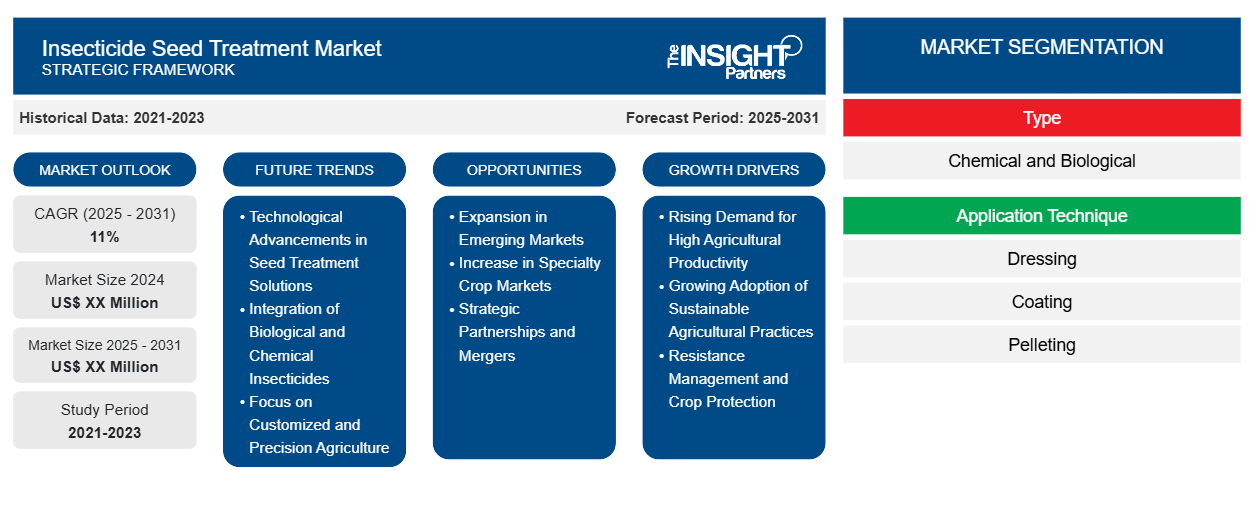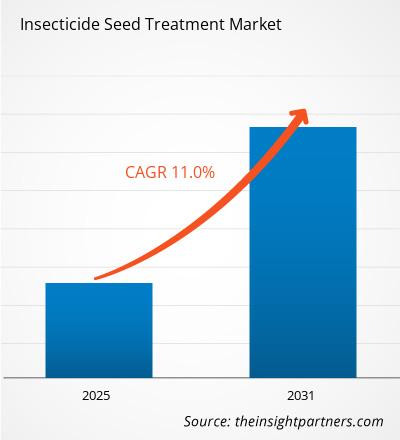The Insecticide Seed Treatment Market is expected to register a CAGR of 11% from 2025 to 2031, with a market size expanding from US$ XX Million in 2024 to US$ XX Million by 2031.
The insecticide seed treatment market report is segmented by type (chemical and biological). The market is segmented based on application technique (dressing, coating, and pelleting). The market is segmented based on form (liquid and dry). The market is segmented based on crop type (cereals and oilseeds, fruits and vegetables, and others). The market size and forecast at global, regional, and country levels for all the key market segments are covered under the scope. The report offers the value in USD for the above analysis, segments, regions, and countries. The report covers market trends, as well as market dynamics such as drivers, restraints, and key opportunities. The report also covers industry landscape and competition analysis covering market concentration, heat map analysis, prominent players, and recent developments in the market.
Purpose of the Report
The report Insecticide Seed Treatment Market by The Insight Partners aims to describe the present landscape and future growth, top driving factors, challenges, and opportunities. This will provide insights to various business stakeholders, such as:
- Technology Providers/Manufacturers: To understand the evolving market dynamics and know the potential growth opportunities, enabling them to make informed strategic decisions.
- Investors: To conduct a comprehensive trend analysis regarding the market growth rate, market financial projections, and opportunities that exist across the value chain.
- Regulatory bodies: To regulate policies and police activities in the market with the aim of minimizing abuse, preserving investor trust and confidence, and upholding the integrity and stability of the market.
Insecticide Seed Treatment Market Segmentation
Type
- Chemical and Biological
Application Technique
- Dressing
- Coating
- Pelleting
Form
- Liquid and Dry
Crop Type
- Cereals and Oilseeds
- Fruits and Vegetables
Customize This Report To Suit Your Requirement
Get FREE CUSTOMIZATIONInsecticide Seed Treatment Market: Strategic Insights

-
Get Top Key Market Trends of this report.This FREE sample will include data analysis, ranging from market trends to estimates and forecasts.
Insecticide Seed Treatment Market Growth Drivers
- Rising Demand for High Agricultural Productivity: One of the primary drivers for the insecticide seed treatment market is the increasing need for higher agricultural yields. With the global population growing rapidly and the demand for food products increasing, farmers are adopting advanced agricultural practices to ensure better crop yields. Insecticide seed treatments help in protecting crops from early-stage insect infestations, leading to healthier plants and higher productivity. By preventing damage to seeds and seedlings from pests, this treatment boosts crop performance and helps achieve the required food production targets.
- Growing Adoption of Sustainable Agricultural Practices: The agricultural industry is increasingly shifting towards sustainable practices to reduce environmental impact and increase long-term viability. Insecticide seed treatments offer several environmental benefits, such as reducing the need for multiple pesticide applications during the growing season. By treating the seed itself, these insecticides are more targeted and efficient, reducing chemical runoff and minimizing exposure to non-target species. With rising awareness about sustainable farming and organic certification, insecticide seed treatments are seen as an eco-friendly and effective option to manage pests while reducing environmental harm.
- Resistance Management and Crop Protection: The growing resistance of insects to traditional chemical pesticides is a significant concern for farmers. Insecticide seed treatments help address this issue by providing an early-stage pest control solution, reducing the need for repeated pesticide applications throughout the growing season. This not only manages resistance more effectively but also lowers the risks of pest resurgence. As pest resistance continues to evolve, seed treatment solutions offer a proactive and integrated pest management strategy that contributes to more resilient farming systems.
Insecticide Seed Treatment Market Future Trends
- Technological Advancements in Seed Treatment Solutions: The insecticide seed treatment market is witnessing significant advancements in the development of more effective and safer insecticide formulations. Biotechnology and nanotechnology are playing a pivotal role in creating novel insecticide treatments with enhanced precision and efficiency. For instance, encapsulation technologies can help deliver insecticides in a controlled manner, reducing their environmental impact while maximizing efficacy. As these innovations continue, they will offer more tailored solutions for specific crops and pest species, enhancing the overall effectiveness of seed treatment.
- Integration of Biological and Chemical Insecticides: There is a growing trend toward integrating biological insecticides with chemical seed treatments to achieve a more balanced and sustainable approach to pest control. Biological agents, such as beneficial microorganisms or plant-derived compounds, are gaining popularity for their ability to complement chemical insecticides and reduce the environmental footprint. Combining these two approaches provides effective pest control while minimizing chemical use, making it an attractive option for farmers focused on sustainability and long-term crop health.
- Focus on Customized and Precision Agriculture: The rise of precision agriculture is reshaping the way farmers approach crop management, including pest control. As data-driven farming becomes more prevalent, customized seed treatments based on specific pest threats, soil conditions, and climate variables are gaining traction. By using technologies like IoT, satellite imagery, and advanced sensors, seed treatments can be tailored to individual farm needs, optimizing both efficacy and cost. This trend toward precision will continue to drive the growth of insecticide seed treatments that are customized for specific crops and environmental conditions.
Insecticide Seed Treatment Market Opportunities
- Expansion in Emerging Markets: The growing adoption of modern agricultural practices in emerging markets presents a significant opportunity for the insecticide seed treatment market. Countries in Asia-Pacific, Latin America, and Africa are increasingly focusing on improving agricultural productivity to feed their expanding populations. As these regions experience higher income levels and growing awareness of the benefits of seed treatments, demand for insecticide-treated seeds is expected to rise. This offers a lucrative opportunity for market players to expand their footprint in these developing regions with customized solutions for local farming practices.
- Increase in Specialty Crop Markets: As farmers diversify into specialty crops, such as fruits, vegetables, and pulses, the demand for specific pest control solutions for these crops is growing. Insecticide seed treatments offer targeted protection for these crops during the critical germination and early growth stages, helping ensure healthy plant development. The growing market for high-value crops presents an opportunity for insecticide seed treatment companies to develop tailored solutions that address the unique pest challenges of specialty crops, driving demand in these niche markets.
- Strategic Partnerships and Mergers: As the insecticide seed treatment market continues to grow, strategic partnerships, collaborations, and mergers between companies in the agricultural and agrochemical sectors offer opportunities for market expansion. By partnering with seed producers, agritech firms, and research organizations, companies can access new technologies, expand product offerings, and enter new geographic markets. These partnerships allow companies to develop comprehensive, integrated pest management solutions that incorporate insecticide seed treatments, offering more holistic benefits to farmers.
Insecticide Seed Treatment Market Report Scope
| Report Attribute | Details |
|---|---|
| Market size in 2024 | US$ XX Million |
| Market Size by 2031 | US$ XX Million |
| Global CAGR (2025 - 2031) | 11% |
| Historical Data | 2021-2023 |
| Forecast period | 2025-2031 |
| Segments Covered |
By Type
|
| Regions and Countries Covered |
North America
|
| Market leaders and key company profiles |
|
Insecticide Seed Treatment Market Players Density: Understanding Its Impact on Business Dynamics
The Insecticide Seed Treatment Market is growing rapidly, driven by increasing end-user demand due to factors such as evolving consumer preferences, technological advancements, and greater awareness of the product's benefits. As demand rises, businesses are expanding their offerings, innovating to meet consumer needs, and capitalizing on emerging trends, which further fuels market growth.

Key Selling Points
- Comprehensive Coverage: The report comprehensively covers the analysis of products, services, types, and end users of the Insecticide Seed Treatment Market, providing a holistic landscape.
- Expert Analysis: The report is compiled based on the in-depth understanding of industry experts and analysts.
- Up-to-date Information: The report assures business relevance due to its coverage of recent information and data trends.
- Customization Options: This report can be customized to cater to specific client requirements and suit the business strategies aptly.
The research report on the Insecticide Seed Treatment Market can, therefore, help spearhead the trail of decoding and understanding the industry scenario and growth prospects. Although there can be a few valid concerns, the overall benefits of this report tend to outweigh the disadvantages.
Frequently Asked Questions
- Historical Analysis (2 Years), Base Year, Forecast (7 Years) with CAGR
- PEST and SWOT Analysis
- Market Size Value / Volume - Global, Regional, Country
- Industry and Competitive Landscape
- Excel Dataset
Recent Reports
Testimonials
Reason to Buy
- Informed Decision-Making
- Understanding Market Dynamics
- Competitive Analysis
- Identifying Emerging Markets
- Customer Insights
- Market Forecasts
- Risk Mitigation
- Boosting Operational Efficiency
- Strategic Planning
- Investment Justification
- Tracking Industry Innovations
- Aligning with Regulatory Trends







 Get Free Sample For
Get Free Sample For